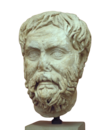Academic skepticism

Academic skepticism refers to the
Overview
| Part of a series on |
| Pyrrhonism |
|---|
 |
|
|
Greek
Around 266 BCE,
The Academics did not doubt the existence of
While the objective of the Pyrrhonists was the attainment of
"...the Academics apprehend (in some sense) the very fact that nothing can be apprehended, and they determine (in some sense) that nothing can be determined, whereas the Pyrrhonists assert that not even that seems to be true, since nothing seems to be true."[10]
Arcesilaus
Up to Arcesilaus, the Platonic Academy accepted the principle of finding a general unity in all things, by the aid of which a principle of certainty might be found.[11] Arcesilaus, however, broke new ground by attacking the very possibility of certainty and denied the possibility of even the Socratic minimum of certainty: "I cannot know even whether I know or not."[11]
The doctrines of Arcesilaus, which must be gathered from the writings of others,
Carneades

The next stage in Academic skepticism was the moderate skepticism of Carneades, which he said owed its existence to his opposition to Chrysippus.[11]
To the Stoic theory of perception, the phantasia kataleptike, by which they expressed a conviction of certainty arising from impressions so strong as to amount to science, he proposed the doctrine of
Knowledge being impossible, a wise man should practice
Philo of Larissa
In Philo of Larissa, we find a tendency not only to reconcile the internal divergences of the Academy itself, but also to connect it with parallel systems of thought.[11] In general, his philosophy was a reaction against the skeptic or agnostic position of the middle and new Academy in favor of the dogmatism of Plato.[16] Philo of Larissa endeavored to show that Carneades was not opposed to Plato, and further that the apparent antagonism between Platonism and Stoicism was because they were arguing from different points of view. From this syncretism emerged the eclectic middle Platonism of Antiochus of Ascalon, the last product of Academic development.[11]
See also
Notes
- ^ a b c One or more of the preceding sentences incorporates text from a publication now in the public domain: Chisholm, Hugh, ed. (1911). "Scepticism". Encyclopædia Britannica. Vol. 24 (11th ed.). Cambridge University Press. pp. 306–309.
- ^ Sextus Empiricus, "Outlines of Pyrrhonism" I.33.232
- ^ Sextus Empiricus, "Outlines of Pyrrhonism" I.33.225–231
- OCLC 715184861.
Pyrrhonism, in whatever form it might have taken after Timon's death in 230 BCE, was utterly neglected until Aenesidemus brought it back to public attention
- ^ Thorsrud 2014, p. 45.
- ^ Thorsrud 2014, pp. 102–103.
- ^ a b c
 This article incorporates text from a publication now in the public domain: Smith, William, ed. (1870). "Arcesilaus". Dictionary of Greek and Roman Biography and Mythology.
This article incorporates text from a publication now in the public domain: Smith, William, ed. (1870). "Arcesilaus". Dictionary of Greek and Roman Biography and Mythology.
- Phaedo, 64–67
- ^ Veres, Máté (2009). "Carlos Lévy, Les Scepticismes; Markus Gabriel, Antike und moderne Skepsis zur Einführung". Rhizai. A Journal for Ancient Philosophy and Science. 6 (1): 107.: 111
- OCLC 635311697.
- ^ a b c d e f g One or more of the preceding sentences incorporates text from a publication now in the public domain: Chisholm, Hugh, ed. (1911). "Academy, Greek". Encyclopædia Britannica. Vol. 1 (11th ed.). Cambridge University Press. pp. 105–106.
- ^ Cicero, Acad. i. 12, iv. 24; De Orat. iii. 18; Diogenes Laertius iv. 28; Sextus Empiricus, Adv. Math. vii. 150, Pyrrh. Hyp. i. 233
- ^ a b One or more of the preceding sentences incorporates text from a publication now in the public domain: Chisholm, Hugh, ed. (1911). "Arcesilaus". Encyclopædia Britannica. Vol. 2 (11th ed.). Cambridge University Press. p. 342.
- ^ a b c One or more of the preceding sentences incorporates text from a publication now in the public domain: Chisholm, Hugh, ed. (1911). "Carneades". Encyclopædia Britannica. Vol. 5 (11th ed.). Cambridge University Press. pp. 363–364.
- ^ One or more of the preceding sentences incorporates text from a publication now in the public domain: Chisholm, Hugh, ed. (1911). "Clitomachus". Encyclopædia Britannica. Vol. 6 (11th ed.). Cambridge University Press. p. 531.
- ^ One or more of the preceding sentences incorporates text from a publication now in the public domain: Chisholm, Hugh, ed. (1911). "Philo of Larissa". Encyclopædia Britannica. Vol. 21 (11th ed.). Cambridge University Press. p. 413.
References
- Thorsrud, Harald (2014). Ancient Scepticism. Routledge. ISBN 978-1-317-49283-2.
External links
- Groarke, Leo. "Ancient Skepticism". In Zalta, Edward N. (ed.). Stanford Encyclopedia of Philosophy.
- Harold Thorsrud. "Ancient Greek Skepticism". Internet Encyclopedia of Philosophy.
